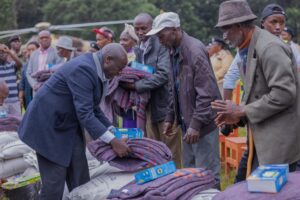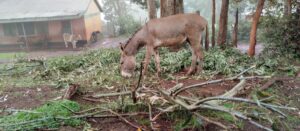How Regional Disparities and Marginalization left Northern Kenya underdeveloped and vulnerable

By Alois Lentoimaga
Soon after he took up his new role as Cabinet Secretary for the Interior, Prof Kithure Kindiki visited Samburu and firmly pledged to deal with the armed gangs in the county that have been tormenting residents.
Samburu is among the eight counties of Northern Kenya that have suffered systemic marginalization and neglect since the advent of colonialism. The causes of the conflicts in our part of the country have been well documented and studied numerous times by both governmental and non-governmental organisations.
The causes are the economic factors that result in competition for scarce resources, cultural factors and beliefs, the withdrawal of National Police Reservists, illiteracy and ignorance and political exclusion and incitement.
The focus of the Kenya Kwanza administration on helping the common people can perhaps offer us some hope that the issues there, the worst of which is the human suffering caused by perpetual insecurity can be resolved once and for all.
From my decades of experience in the community, administration and most recently as a lawmaker, I see a need to think of interventions that can be put in place immediately, in the middle term and in the long-term to attempt to correct the situation there.
Under the prevailing situation, where the state security presence is minimal in the vast pastoral areas and operating with over-stretched resources, the most cost-effective and easiest way of managing insecurity is by engaging the services of National Police Reservists.
The new crop of NPRs should be young, energetic, literate and responsible people who should be economically empowered to protect their integrity. Proper training under the guidance of the National Police Service, favourable working conditions and continuous monitoring will ensure that the reservists are professional and accountable.
With their knowledge of the situation on the ground and the terrain, NPRs can be part of a community-oriented approach to having a responsive and accountable security agency in Northern Kenya.
To resolve cattle rustling activities, marginalization and struggle over resources, the county and national governments and other stakeholders should resolve border conflicts among these communities which are a major cause of insecurity.
A recent survey has found that cattle rustling activities are the highest contributing factor to insecurity in Northern Kenya. The survey recommended that the pastoralists be encouraged and educated to diversify their income-generating activities to reduce their dependence on cattle for food and income.
Getting dropouts back in school and establishing Technical and Vocational Education and Training (TVET) institutions can enable our youth to escape the idleness that leads them to getting involved in cattle rustling and banditry.
The new government should reformulate the policies aimed at addressing insecurity such as disarmament efforts by security forces. The national government should abandon forceful disarmament and instead adopt international best practices such as the United Nations disarmament demobilization and reintegration principles and programmes.
The new administration should also address issues of human security and the reasons why people acquire guns. It should further address reasons why these communities feel that the government has abandoned them in matters of personal security.
Serious policies to address the problem of cattle rustling should be put in place. For instance, there should be laws in place on how to deal with cattle rustling activities. There should be enhanced synergy between the national focal points on illegal firearms in Kenya and neighboring countries such as Uganda, Sudan and Ethiopia to control the insecurity menace.
There is also a need to establish a county peace infrastructure that links the villages and the wards through the existing local peace committees and the county levels, enabling them to monitor, manage, and respond to any emerging conflicts.
Peace committees should be focused on or eliminate tribal hatred and stereotypes among the pastoralist communities in the North.
While there have been efforts in the past, setting up a task force to involve the community and political leadership in looking for solutions would also ensure there is buy-in from the residents.
The New government should deploy the use of digital devises like drones, this should be able to capture clear photos of bandits and activate security personnel to pursue them.
Buy use of drone technology the security personnel will be able to track the movements of stolen animals up to the bandits’ homes using a Global Positioning System (GPS). This will show the whereabouts of livestock right from the spot where the theft occurred. If drones have been used to capture wanted terrorists elsewhere, they can be used to monitor banditry too.
Opening up the entire Northern Kenya through road infrastructure in order to access inaccessible areas prone to banditry and cattle rustling will help in curbing; tribal clashes, livestock theft and flushing out bandits and cattle rustlers. This will also improve Northern Kenya economically, since good infrastructure will bring development.
Mr. Alois Lentoimaga, a former MP for Samburu North, served as the Vice Chairman of the National Assembly’s Committee on Security between 2013 and 2017.







